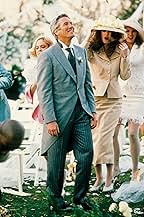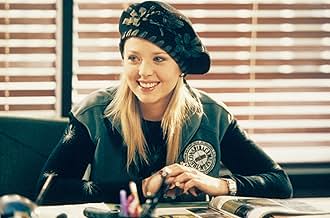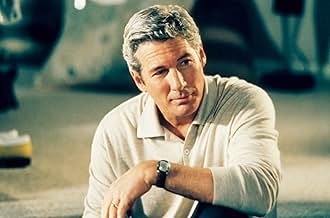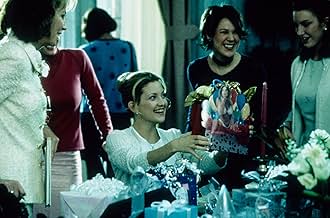IMDb RATING
4.7/10
21K
YOUR RATING
A wealthy gynecologist's ideal life is thrown into turmoil when the women closest to him begin to affect his life in unexpecting ways.A wealthy gynecologist's ideal life is thrown into turmoil when the women closest to him begin to affect his life in unexpecting ways.A wealthy gynecologist's ideal life is thrown into turmoil when the women closest to him begin to affect his life in unexpecting ways.
- Awards
- 4 nominations total
Holly Pelham
- Joanne
- (as Holly Pelham-Davis)
- Director
- Writer
- All cast & crew
- Production, box office & more at IMDbPro
Featured reviews
Robert Altman is frustratingly inconsistent, and here is at his worst. His very personal style has three characteristics:
1. Many-threaded storylines and characters, many of which raise questions that are not answered in the play. When done well, you get the impression of moving through the world with a curious voyeurism, dipping into many lives which are intriguing enough to learn more about. Except for the youngest daughter, none of these women are worth digging more into. The misogynism could have been an advantage; here it is cheap.
2. Spontaneous acting. Altman doesn't tell his actors what to do, trusting them to bring something fresh. In the best case, the differing visions of the actors add to the manyhued effect described above. But you need powerful actors like he had in "Cookie's Fortune." These folks, some of whom are fine when given direction, simply can't synthesize.
3. Wonderful tracking shots (which move from character to character so enhance the two effects noted above). Check out the first shot in "The Player." That alone is worth the admission. Here, we have a busily choreographed shot at the beginning and a dizzy pullback at the end, but neither to any useful effect.
Avoid this film. The master was asleep.
1. Many-threaded storylines and characters, many of which raise questions that are not answered in the play. When done well, you get the impression of moving through the world with a curious voyeurism, dipping into many lives which are intriguing enough to learn more about. Except for the youngest daughter, none of these women are worth digging more into. The misogynism could have been an advantage; here it is cheap.
2. Spontaneous acting. Altman doesn't tell his actors what to do, trusting them to bring something fresh. In the best case, the differing visions of the actors add to the manyhued effect described above. But you need powerful actors like he had in "Cookie's Fortune." These folks, some of whom are fine when given direction, simply can't synthesize.
3. Wonderful tracking shots (which move from character to character so enhance the two effects noted above). Check out the first shot in "The Player." That alone is worth the admission. Here, we have a busily choreographed shot at the beginning and a dizzy pullback at the end, but neither to any useful effect.
Avoid this film. The master was asleep.
Robert Altman's latest is not a frothy romantic comedy about a womanizer as the ads suggest. It is instead a deceptively simple, yet busy, multi-layered, character study of a Truffaut-like character (the Man who Loved Women) who has nearly become a martyr to the women that surround him.
Dr T. loves his wife too much, he's successful and looks like Richard Gere. He's remained faithful to the wife who has become more and more spoiled and selfish and now suffers from a fictional malady which causes her to regress to childhood behavior- which includes jumping into a fountain in a crowded mall, and stripping off all her clothes and giving up sex entirely because it's too naughty. One of his spoiled daughters is about to get married, and about to become a famous cheerleader, the other spoiled daughter works at the Dallas Conspiracy Museum fretting about mom, her sister and just about everything. There's a spoiled sister-in-law who's separated, drinks too much and has moved into his house with her three kids. And there's also dozens of rich, pampered Dallas society women he treats. You see, Dr. T is a gynecologist.
Dr. T. eventually explains that to him women are saints. When they go wrong or go bad it's a man's fault. He's about to learn a hard lesson, that his belief is a little bit lopsided, a little bit too much of a good thing. Nobody is perfect, not even women. And Men ... not even him, should ever be so presumptuous to believe they have the ultimate control.
Now there's some critics and writers who have apparently already decided the film is more than a little misogynistic. They need to watch the film a few more times. There are others that have decided the film is a lighter than latte foam. They also need to watch the film a few more times.
It's far from a perfect film, and it isn't an important film with a message or one that ends with a powerful emotional wallop that sucker punches you at it's conclusion.
No, this is a wonderfully written, masterfully directed, perfectly cast, brilliantly acted gem of a film. It's almost a modern screwball comedy, the way a Sturges may have delivered one, if he had been Altman.
I suspect there are several scenes the film critics are identifying or complaining about as being slightly off mark. For me there were two. And they were minor. One involves a scene in which a women patient is allowed to smoke. The smoking is over-exaggerated... like the women is actually an actresses pretending to smoke.. too quickly, too desperately. It's one of the few phony, overly deliberate scenes in the film. The other is when Dr. T is told a secret about his about to wed daughter Dee Dee, by his other daughter. It plays false, because the revelation should not throw his character for quite the loop it does, in quite the way it does.
The film quickly recovers from both of these brief stumbles however.
A casual film-goer might take a lot of what Altman does for granted. So permit me this obvious to many, explanation.
In real life, when we are in a crowded room we can hear several conversations at once, and tune in and out of the ones we want to over-hear. However, to duplicate this on film is quite a difficult technical feat. To wire the room properly for sound, to get everyone talking at the right volume, to get the mixing of volumes in post production and make sure all of the conversations can be heard, to decide how they are blended in and around one another, to create believable movement... well it's a remarkable achievement. Altman perfected this technique, and few do it as well or as successfully. Few create entire scenes that drip with layers of texture and detail like an Altman scene often can. Few give a feeling of depth to both foreground and background characters within the same scene. Few give so many actors a moment here and a moment there to react or do just the right thing. Few let us glimpse at both sides of a situation the way Altman lets us. It can be confusing, and it isn't necessary to the plot of the film. It just adds a layer of authenticity to every shot. Minor characters and extras may have a bit of business which is so perfectly done, such a rightly captured human moment it makes us smile with its truth.
The danger of course is by making sure to get so many details right, it forces us to closely inspect every other detail of the film. Sometimes some details aren't right. Sometimes some details ring false, or are missed or passed over.
We forgive Altman for these things in many of his films, because the stumbles are going to happen when you push so hard, to be so precise, yet remain loose enough to give your actors the room they need to act, to improvise, to find their moments. When you trust people, be they art directors or actors, not all their decisions are going to be good ones. But you let them make their mistakes. You let them have their moments, good, and not so good. You hope the not so good moments give the film a shaggy dog feel. It's imperfections transform into making the film oh so much more precious and endearing because it isn't perfect.
Altman paints as he goes. It's a technique that is like a high wire artist in a circus working without a net. Altman has fallen many times in the past. But he's lived through his falls.
And now with Dr T and the Women he dazzles us with a lifetime of his experience behind the camera, constructing scenes, working with actors, and proves himself a master. He's taken for granted these days and when his films are less than they should be, critics will take to calling him a traffic manager, yet when it does work the way it's supposed to-- few call him a genius.
He's not really a genius.... He's Altman. He's been doing things the way he pleases for nearly 40 years now. Ever since he refused to direct his third Alfred Hitchcock Presents episode in the 60's and got himself fired. Ever since he followed his smash hit Mash, with the quirky and bizarre Brewster McCloud. Ever since he directed such brilliant films as McCabe and Mrs. Miller, The Long Goodbye, Thieves Like Us, and of course Nashville. He falls right on his face with things like Quintet and Beyond Therapy. He can direct a disappointment like Popeye and then turn his back completely on Hollywood and the studios for nearly ten years to concentrate on directing little known and quirky plays like Come Back to the Five and Dime, Jimmy Dean, Jimmy Dean, Streamers, and Secret Honor.
This is the guy capable of directing one of the greatest political satires ever made -- Tanner 88 (For HBO) and then make a triumphant critical return to Hollywood with The Player, follow that up with the masterpiece Short Cuts only to let nearly everyone down with Ready to Wear and Kansas City. He then got another studio system project to direct and fought with studio executives over his final cut of The Gingerbread Man. The film was not thought of as a success.
Then there was Cookie's Fortune, a fine quirky little ensemble piece and now a bigger quirker ensemble piece; Dr T and the Women.
Altman is a film-maker who continues to do things exactly as he pleases. Even at 75, he's making controversial films which will inspire film-makers to reach beyond formulas and focus groups and create something which defies labels and perhaps even genres. They are also tough films to market to an audience.
Just look at what he does at the end of Dr. T and the Women. He could have chosen to let the film wind down, but instead he takes a giant leap and I believe scores a huge victory for doing so.
Altman is the undisputed master of creating moments that will frustrate some, exhilarate others but ultimately be precisely the type of ending the material demanded all along.
The last line of the film ties into the film in a surprising, spiritual manner that couldn't be more perfect, couldn't be more simple and yet is an extreme risk which I suspect many critics will consider it a flaw. Some may even read it incorrectly.
Not everyone is going to like or even accept what Altman does. But if you have been paying attention to the film, I trust you will respect what he does.
Altman has not stunt casted, or forced any of his actors to stretch beyond what they are capable of. Even Helen Hunt who I find to be an appealing but extremely limited actress , turns in a performance that uses her few strengths so well, you don't notice her weaknesses.
Richard Gere has never been better, and probably never will be this good again.
Dr. T & The Women is a quirky character study of a man who believes he understands women better than he understands himself. He discovers he doesn't understand himself very well at all and consequently doesn't know women all that well either.
There are several witty, satirical, clever and funny observations being made about a great many things in the film, but there are also some keenly made ones that speak directly to the heart and soul of the human psyche. It's here the film becomes much more than the humorous exercise it's pretending to be most of the time. It is here that subsequent viewings will reveal there is a lot more going on in the film than you might have originally believed.
Altman has delivered not a little truffle of a film here, but a richly, layered masterpiece to be savored and enjoyed over and over again.
Don't miss it.
Dr T. loves his wife too much, he's successful and looks like Richard Gere. He's remained faithful to the wife who has become more and more spoiled and selfish and now suffers from a fictional malady which causes her to regress to childhood behavior- which includes jumping into a fountain in a crowded mall, and stripping off all her clothes and giving up sex entirely because it's too naughty. One of his spoiled daughters is about to get married, and about to become a famous cheerleader, the other spoiled daughter works at the Dallas Conspiracy Museum fretting about mom, her sister and just about everything. There's a spoiled sister-in-law who's separated, drinks too much and has moved into his house with her three kids. And there's also dozens of rich, pampered Dallas society women he treats. You see, Dr. T is a gynecologist.
Dr. T. eventually explains that to him women are saints. When they go wrong or go bad it's a man's fault. He's about to learn a hard lesson, that his belief is a little bit lopsided, a little bit too much of a good thing. Nobody is perfect, not even women. And Men ... not even him, should ever be so presumptuous to believe they have the ultimate control.
Now there's some critics and writers who have apparently already decided the film is more than a little misogynistic. They need to watch the film a few more times. There are others that have decided the film is a lighter than latte foam. They also need to watch the film a few more times.
It's far from a perfect film, and it isn't an important film with a message or one that ends with a powerful emotional wallop that sucker punches you at it's conclusion.
No, this is a wonderfully written, masterfully directed, perfectly cast, brilliantly acted gem of a film. It's almost a modern screwball comedy, the way a Sturges may have delivered one, if he had been Altman.
I suspect there are several scenes the film critics are identifying or complaining about as being slightly off mark. For me there were two. And they were minor. One involves a scene in which a women patient is allowed to smoke. The smoking is over-exaggerated... like the women is actually an actresses pretending to smoke.. too quickly, too desperately. It's one of the few phony, overly deliberate scenes in the film. The other is when Dr. T is told a secret about his about to wed daughter Dee Dee, by his other daughter. It plays false, because the revelation should not throw his character for quite the loop it does, in quite the way it does.
The film quickly recovers from both of these brief stumbles however.
A casual film-goer might take a lot of what Altman does for granted. So permit me this obvious to many, explanation.
In real life, when we are in a crowded room we can hear several conversations at once, and tune in and out of the ones we want to over-hear. However, to duplicate this on film is quite a difficult technical feat. To wire the room properly for sound, to get everyone talking at the right volume, to get the mixing of volumes in post production and make sure all of the conversations can be heard, to decide how they are blended in and around one another, to create believable movement... well it's a remarkable achievement. Altman perfected this technique, and few do it as well or as successfully. Few create entire scenes that drip with layers of texture and detail like an Altman scene often can. Few give a feeling of depth to both foreground and background characters within the same scene. Few give so many actors a moment here and a moment there to react or do just the right thing. Few let us glimpse at both sides of a situation the way Altman lets us. It can be confusing, and it isn't necessary to the plot of the film. It just adds a layer of authenticity to every shot. Minor characters and extras may have a bit of business which is so perfectly done, such a rightly captured human moment it makes us smile with its truth.
The danger of course is by making sure to get so many details right, it forces us to closely inspect every other detail of the film. Sometimes some details aren't right. Sometimes some details ring false, or are missed or passed over.
We forgive Altman for these things in many of his films, because the stumbles are going to happen when you push so hard, to be so precise, yet remain loose enough to give your actors the room they need to act, to improvise, to find their moments. When you trust people, be they art directors or actors, not all their decisions are going to be good ones. But you let them make their mistakes. You let them have their moments, good, and not so good. You hope the not so good moments give the film a shaggy dog feel. It's imperfections transform into making the film oh so much more precious and endearing because it isn't perfect.
Altman paints as he goes. It's a technique that is like a high wire artist in a circus working without a net. Altman has fallen many times in the past. But he's lived through his falls.
And now with Dr T and the Women he dazzles us with a lifetime of his experience behind the camera, constructing scenes, working with actors, and proves himself a master. He's taken for granted these days and when his films are less than they should be, critics will take to calling him a traffic manager, yet when it does work the way it's supposed to-- few call him a genius.
He's not really a genius.... He's Altman. He's been doing things the way he pleases for nearly 40 years now. Ever since he refused to direct his third Alfred Hitchcock Presents episode in the 60's and got himself fired. Ever since he followed his smash hit Mash, with the quirky and bizarre Brewster McCloud. Ever since he directed such brilliant films as McCabe and Mrs. Miller, The Long Goodbye, Thieves Like Us, and of course Nashville. He falls right on his face with things like Quintet and Beyond Therapy. He can direct a disappointment like Popeye and then turn his back completely on Hollywood and the studios for nearly ten years to concentrate on directing little known and quirky plays like Come Back to the Five and Dime, Jimmy Dean, Jimmy Dean, Streamers, and Secret Honor.
This is the guy capable of directing one of the greatest political satires ever made -- Tanner 88 (For HBO) and then make a triumphant critical return to Hollywood with The Player, follow that up with the masterpiece Short Cuts only to let nearly everyone down with Ready to Wear and Kansas City. He then got another studio system project to direct and fought with studio executives over his final cut of The Gingerbread Man. The film was not thought of as a success.
Then there was Cookie's Fortune, a fine quirky little ensemble piece and now a bigger quirker ensemble piece; Dr T and the Women.
Altman is a film-maker who continues to do things exactly as he pleases. Even at 75, he's making controversial films which will inspire film-makers to reach beyond formulas and focus groups and create something which defies labels and perhaps even genres. They are also tough films to market to an audience.
Just look at what he does at the end of Dr. T and the Women. He could have chosen to let the film wind down, but instead he takes a giant leap and I believe scores a huge victory for doing so.
Altman is the undisputed master of creating moments that will frustrate some, exhilarate others but ultimately be precisely the type of ending the material demanded all along.
The last line of the film ties into the film in a surprising, spiritual manner that couldn't be more perfect, couldn't be more simple and yet is an extreme risk which I suspect many critics will consider it a flaw. Some may even read it incorrectly.
Not everyone is going to like or even accept what Altman does. But if you have been paying attention to the film, I trust you will respect what he does.
Altman has not stunt casted, or forced any of his actors to stretch beyond what they are capable of. Even Helen Hunt who I find to be an appealing but extremely limited actress , turns in a performance that uses her few strengths so well, you don't notice her weaknesses.
Richard Gere has never been better, and probably never will be this good again.
Dr. T & The Women is a quirky character study of a man who believes he understands women better than he understands himself. He discovers he doesn't understand himself very well at all and consequently doesn't know women all that well either.
There are several witty, satirical, clever and funny observations being made about a great many things in the film, but there are also some keenly made ones that speak directly to the heart and soul of the human psyche. It's here the film becomes much more than the humorous exercise it's pretending to be most of the time. It is here that subsequent viewings will reveal there is a lot more going on in the film than you might have originally believed.
Altman has delivered not a little truffle of a film here, but a richly, layered masterpiece to be savored and enjoyed over and over again.
Don't miss it.
... It doesn't so much 'depress' me that people don't like this film, as it does when I find out the REASONS people dislike it. I didn't even feel moved to comment until I realized the staggering lack of depth that's comprised in most people's criticisms here. I figured that I'd just watched a pleasant enough comedic trifle. Apparently not.
People, dislike this film by all means - it's hardly the best I've ever seen - but don't vilify it for the very qualities that were wholly intentional. I mean, how many of the 'naysayers' here have even the SLIGHTEST passing knowledge of Frank Capra???! There were odd moments here and there in this that struck me as being decidedly Capraesque...
Gere is PERFECT as the guy who - without arrogance - is convinced that he can be every woman's knight in shining armour... Trouble is, they don't NEED any 'convincing'! So, what exactly happens when you take a guy like this and show him a woman who is, by the best information available, completely self-sufficient? All I can say is: If this scenario even slightly intrigues you, then watch it and find out... !
I think the ending is very fitting, too... (e-mail or PM me for reasons if you disagree; as I don't wish to spoil too much for the good people that are yet to watch!) Rather 'Buddhist' - so surely appropriate for a man of Mr. Gere's persuasion... ?!
(7/10, or ***/***** in profile ratings system.)
People, dislike this film by all means - it's hardly the best I've ever seen - but don't vilify it for the very qualities that were wholly intentional. I mean, how many of the 'naysayers' here have even the SLIGHTEST passing knowledge of Frank Capra???! There were odd moments here and there in this that struck me as being decidedly Capraesque...
Gere is PERFECT as the guy who - without arrogance - is convinced that he can be every woman's knight in shining armour... Trouble is, they don't NEED any 'convincing'! So, what exactly happens when you take a guy like this and show him a woman who is, by the best information available, completely self-sufficient? All I can say is: If this scenario even slightly intrigues you, then watch it and find out... !
I think the ending is very fitting, too... (e-mail or PM me for reasons if you disagree; as I don't wish to spoil too much for the good people that are yet to watch!) Rather 'Buddhist' - so surely appropriate for a man of Mr. Gere's persuasion... ?!
(7/10, or ***/***** in profile ratings system.)
I'm sorry, but I like this movie. It might just be my defense of Robert Altman, but I think that this is a good comedy. Dr. T who devotes his life to taking care of women, but never considers how they could take care of themselves. He loves everything about women, and women love him. However, nothing he can do can protect them in the end.
The problem is that this film was presented as a movie for women: a date movie that you can drag a boyfriend or husband to in order to prove love and devotion. The film is actually examining women, their needs and relationships with or without a strong male figure. This isn't a chick flick; it's an analytic comedy. So, the intended movie date turns out to be a disappointment for both parties who have no idea what to expect.
The only positive aspect of this whole misunderstanding is that now, years later, Dr. T ends up on the cheap rack at any DVD store. So don't rent it, buy it, give it another look and even if you don't like it, sell it for even cheaper. When this movie is available for less than a dollar, no one will have any excuse not to watch it. Several of the people will end up actually liking it.
The problem is that this film was presented as a movie for women: a date movie that you can drag a boyfriend or husband to in order to prove love and devotion. The film is actually examining women, their needs and relationships with or without a strong male figure. This isn't a chick flick; it's an analytic comedy. So, the intended movie date turns out to be a disappointment for both parties who have no idea what to expect.
The only positive aspect of this whole misunderstanding is that now, years later, Dr. T ends up on the cheap rack at any DVD store. So don't rent it, buy it, give it another look and even if you don't like it, sell it for even cheaper. When this movie is available for less than a dollar, no one will have any excuse not to watch it. Several of the people will end up actually liking it.
Like much of Robert Altman's work, this is a hit and miss movie, but worth seeing for some good performances, several genuinely funny scenes, and some of the master's typical ensemble sequences with all hell breaking loose while everybody talks at once! It is probably unhelpful to approach it as though it was a full-blooded satire on wealthy Texas women. For a start, the target is too easy - like the floating and walking birds Dr T and his buddies seem to think it's fair to shoot at - and in any case the focus of the film is not the Women of the title, but Dr T.
Richard Gere gives a typically charming and understated, performance as Dr T (for Travis), who is surrounded by women whom he likes and respects in private life, and cares for in his professional life as a gynecologist, but no more understands than most men. Farrah Fawcett gives a touching portrayal as his wife, who retreats into childhood to escape his smothering affection. Helen Hunt, as an independently-minded, intelligent golf pro, provides a refreshing change - both for Dr T and the audience - from the empty-headed shopaholics who people much of the movie. Laura Dern, Kate Hudson and Shelley Long sparkle as, respectively, Dr T's sister-in-law, daughter and receptionist. (As we might expect from Altman, the city of Dallas also plays a leading role; and the best casting is definitely that of Eric Ryan as the "birth baby"; Eric enters the IMDb actors data base at the tender age of zero!)
This is a long way from the vintage Altman of Mash, Nashville and The Player; but is still richer than most Hollywood fare.
Richard Gere gives a typically charming and understated, performance as Dr T (for Travis), who is surrounded by women whom he likes and respects in private life, and cares for in his professional life as a gynecologist, but no more understands than most men. Farrah Fawcett gives a touching portrayal as his wife, who retreats into childhood to escape his smothering affection. Helen Hunt, as an independently-minded, intelligent golf pro, provides a refreshing change - both for Dr T and the audience - from the empty-headed shopaholics who people much of the movie. Laura Dern, Kate Hudson and Shelley Long sparkle as, respectively, Dr T's sister-in-law, daughter and receptionist. (As we might expect from Altman, the city of Dallas also plays a leading role; and the best casting is definitely that of Eric Ryan as the "birth baby"; Eric enters the IMDb actors data base at the tender age of zero!)
This is a long way from the vintage Altman of Mash, Nashville and The Player; but is still richer than most Hollywood fare.
Did you know
- TriviaTo make Farrah Fawcett more comfortable for her nude scene in the fountain, director 'Robert Altman' had cleared the entire stage of people, except for himself, the director of photography, and the sound recordist. To everyone's surprise, she refused to do the scene without the crowd, stating she was not at all embarrassed by her naked body. So the extras were let in, she performed the scene completely naked, and received a standing ovation from the crowd afterwards.
- GoofsThe "newborn" baby is born circumcised.
- Quotes
Bree Davis: You see women all day, every day. How do they keep from just runnin' together?
Dr. Sullivan "Sully" Travis, "Dr. T": I think every single woman I've ever met has got somethin' special about her, somethin' that sets her apart from the rest.
Bree Davis: Well, if a gynecologist says there's no two alike, I guess there's no two alike!
- Crazy creditsIn the opening credits, actors have their names appear in a plain sans serif font while actress have their names appear in a flowing script font.
- SoundtracksYou've Been So Good Up to Now
(1992)
Composed by Lyle Lovett
Performed by Lyle Lovett
Published by Michael H. Goldsen Inc./Lyle Lovett
Courtesy of MCA Records/Curb Music Co.
Under license from Universal Music Enterprises
- How long is Dr. T & the Women?Powered by Alexa
Details
- Release date
- Countries of origin
- Languages
- Also known as
- Docteur T et les femmes
- Filming locations
- Production companies
- See more company credits at IMDbPro
Box office
- Budget
- $23,000,000 (estimated)
- Gross US & Canada
- $13,113,041
- Opening weekend US & Canada
- $5,012,867
- Oct 15, 2000
- Gross worldwide
- $22,844,291
- Runtime2 hours 2 minutes
- Color
- Sound mix
- Aspect ratio
- 2.35 : 1
Contribute to this page
Suggest an edit or add missing content




































